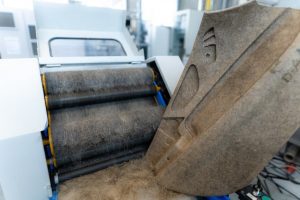The current assessment report of the Intergovernmental Panel on Climate Change (IPCC) has highlighted the urgency by which we must transform value creation processes in order to secure the future of the earth as a healthy biosphere. Approximately 8 – 10% (about 4 to 5 billion tonnes) of global CO2 emissions are generated during the production of textiles. The textile industry is responsible for about 92 million tons of textile waste per year, most of which is landfilled or incinerated. Less than 1% of the 100 billion textiles manufactured annually worldwide are recycled and regenerated into high-quality products. Thus, the textile industry is still far away from a circular economy. Technologies for recycling and reprocessing for textile products, which are characterised by a complex mix of materials, are scarce. The logistics for collecting, sorting and separating textile waste leave many questions unanswered.
Textile-based lightweight construction is a basis for a resource-efficient transport sector. But how do we recycle the expensive and complex material mixes, once cars, planes and other vehicles have reached the end of their service life? Incineration is not a solution for the future!

The necessary transformation process to a circular economy must incorporate all stakeholders of the textile industry: From the raw material along the textile production chain to the users of the products – including reprocessing and recycling, also in the sense of upcycling. Both, regulatory intervention in the market and changes in the attitudes and behaviour of market participants are required. Research must develop innovative and sustainable solutions, which have to be validated and scaled for market use. Classic linear business models will be supplemented or even replaced by new, digitally based value value added networks. The textile sector must open up to neighbouring sectors in order to exploit synergy effects – e.g. the use of agricultural waste as raw material for textile fibres. When it comes to raw materials, the textile industry must not be in competition with global food production. In this respect, there are no simple solutions; the research questions are complex and can only be solved with a holistic approach and in a transdisciplinary manner.
Against this background, the ITA Group is presenting itself as the International Centre for Sustainable Textiles. The ITA Group is formed around the Institut für Textiltechnik of RWTH Aachen University (ITA) as a core with several spin-offs and branches to address specific market needs and topics.
Our goal is the holistic biotransformation of textile technology and thus the use of biological principles for cycle-oriented value creation processes. This includes, for example, the closing of raw material cycles, the reduction of energy and water consumption for production processes and the principle of “design for recycling” as a fundamental paradigm of product development. An existing flagship is the innovation space BIOTEXFUTURE . The aim is to develop a biobased and sustainable raw material base for plastics, its application in the textile industry and to address an overall societal change towards a bioeconomy. Another flagship project with major contribution from ITA is Bio4MatPro , the competence centre for the biological transformation of materials science and production technology.
The transformation process of the textile world must also integrate economic and social issues. The UN’s Sustainable Development Goals (SDGs) set out a complex framework of requirements which must be met. This involves the economic design of process chains, the realignment of business models and sustainable innovation management. – taking into account the impact on the people who produce, use and recycle textiles. Thus, the future of work is another important focus of our research. Jobs, both in production and in all other functional areas of companies, are changing massively. The associated transformation and qualification processes means are a great challenge to us.
The digitalisation of all areas of life should also be seen as an opportunity in the context of a biotransformation. The highly fragmented value chain with many individual processes is increasingly networked and digitally mapped. Based on the paradigms of Industry 4.0, the implementation of AI use cases, digital business models and data-based networking along the value stream is now the new challenge. Textile products are also becoming digital (smart textronics). A corresponding production technology for serial production of customised smart textiles must be developed, including the corresponding recycling concepts.
Textile Innovations: Sustainable. Digital. Individual.
As an internationally active research and qualification service provider with about 400 employees, ITA Group develops fibre-based high-performance materials, textile semi-finished products and their production processes.
- The Institut für Textiltechnik of RWTH Aachen University (ITA) focusses on academic teaching and research in the entire range of applications for the global megatrends. ITA is embedded in the excellent research location of Aachen, with numerous globally renowned cooperation partners, especially from RWTH Aachen University and the Forschungszentrum Jülich. The director of ITA and ITA Group is Prof. Thomas Gries.
- ITA GmbH is the technology transfer institution for bi- or multilateral cooperation with companies worldwide.
- ITA Academy with the Digital Capability Center is our training and development partner for the digitalisation of production processes.
- ITA Augsburg develops innovative processes for textile recycling and cost-efficient composite materials.
- APS – European Centre for Mechatronics stands for collaborative robotics and smart systems.
- The Smart Textronics Center (STC) brings together the expertise of SMEs in South Korea and Germany to design and series production of smart textiles.
- ITA Medical develops, produces and distributes semi-finished textile products for medical applications.
Contact
Dr.-Ing. Bernhard Schmenk
Head of Corporate Development
Tel.: +49 241 80 234 58
E-Mail: bernhard.schmenk@ita.rwth-aachen.de
Supplier
Institut für Textiltechnik (ITA) – RWTH Aachen
Intergovernmental Panel on Climate Change (IPCC)
Share
Renewable Carbon News – Daily Newsletter
Subscribe to our daily email newsletter – the world's leading newsletter on renewable materials and chemicals













